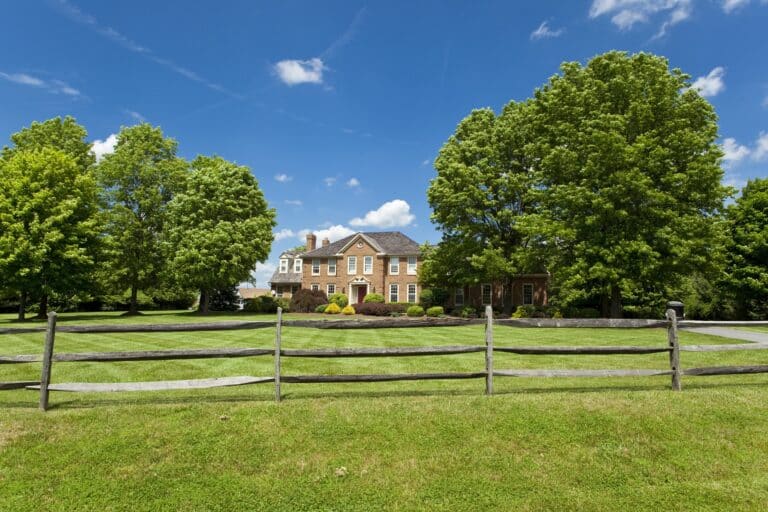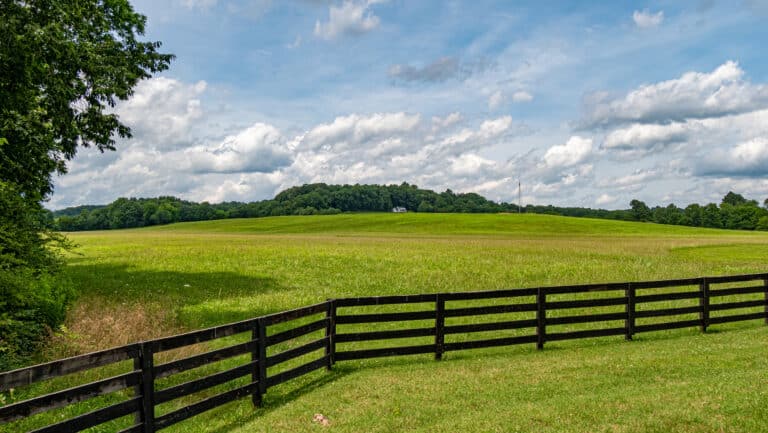What is a Hobby Farm?
A hobby farm is a small-scale agricultural operation where farming activities generate income, but the primary source of revenue comes from off-farm employment. Unlike commercial farms that depend entirely on agricultural production, hobby farms blend rural living with agricultural pursuits. This can be raising backyard chickens, growing vegetables for your community, or keeping a small herd of goats.
According to the USDA’s Census of Agriculture, small farms (those with less than $50,000 in annual sales) represent approximately 89% of all U.S. farms.[1] Many fit the hobby farm model, where landowners maintain jobs while managing livestock, gardens, or orchards on their property.
Hobby farms exist on a spectrum: from urban residents raising backyard chickens to rural landowners managing 20-50 acres with rotational grazing and seasonal vegetable production. What unites these operations is that farming serves as a passionate pursuit rather than the primary means of financial support. The rise of hobby farming connects directly to cultural shifts toward farm-to-table eating, sustainable agriculture, and food transparency.
Should I Start a Hobby Farm? The Real Questions to Ask
Starting a hobby farm requires honest self-assessment before you invest time, money, and energy. Social media showcases picturesque moments, baskets of fresh eggs, baby goats in pastures, thriving tomato plants, while daily realities remain invisible. Successful hobby farming demands research, planning, financial investment, and sustained commitment through all seasons.
Time Commitment: The Daily Reality
Hobby farming operates on nature’s schedule, not yours. Livestock requires daily care regardless of weather, holidays, or work obligations. Your chickens need feeding, watering, and egg collection every single day and yes, even Christmas morning when it’s 10 degrees outside. Small operations typically require 1-2 hours daily, plus additional time for weekly maintenance and seasonal projects.[2]
The learning curve is steep. You’ll spend hours researching best practices, troubleshooting problems, and learning from inevitable mistakes. The “tuition” often comes in failed crops, lost animals, and expensive corrections to initial setup errors.
Financial Investment: Start-Up and Ongoing Costs
Infrastructure costs add up quickly: fencing, animal shelter, year-round water systems, and storage. A basic chicken coop with secure fencing runs $500-2,000, while pasture fencing easily reaches $1,000-3,000 or more.[3]
Ongoing expenses include feed, bedding, veterinary care, seeds, soil amendments, and equipment maintenance. A small flock of six chickens consumes $30-50 in feed monthly, plus bedding and occasional care. Many beginning hobby farmers underestimate these recurring costs.
Essential Questions Before You Begin
Consider these questions honestly:
- Land and Resources: Does your property have adequate water for livestock and irrigation? What soil type do you have? Do you need to build shelter, or does suitable infrastructure exist?
- Regulations: What are local zoning laws regarding livestock and agricultural structures? Does your HOA permit farming activities? How will neighbors respond?[4]
- Your Capacity: Can you handle the physical labor of hauling water, moving feed, working in challenging weather? Do you have backup care for emergencies? Can your budget absorb unexpected costs?
Answering these questions honestly will help you determine whether hobby farming aligns with your current lifestyle, resources, and goals.
Planning Your Land: Infrastructure and Preparation
Before bringing home your first animal or planting your first seed, understanding your land’s characteristics and preparing appropriate infrastructure sets the foundation for success. This preparation phase requires patience, but investing time upfront prevents costly mistakes.
Know Your Land
Start with a soil test through your local Cooperative Extension office to reveal pH levels, nutrient content, and soil type. This is critical information for both gardening and pasture management.[5] Assess your water sources: wells, ponds, streams, or municipal connections. Livestock needs 1-2 gallons of water daily per chicken and 2-3 gallons for goats, while gardens require roughly one inch of water weekly during growing season.[6]
Walk your property through different seasons if possible. Where does water drain during heavy rains? Which areas get full sun versus shade? These observations inform decisions about garden placement and shelter locations.
Essential Infrastructure Questions
Consider these key infrastructure needs:
- Fencing: What will you need to contain or protect? Poultry, livestock, and gardens each require different fencing solutions.[7]
- Shelter: Do your animals need protection from weather and predators? Will your structures handle winter conditions?
- Water systems: How will you deliver water year-round, including during freezing temperatures?
- Storage: Where will you store feed, tools, bedding, and equipment protected from weather and pests?
Rather than attempting to prepare your entire property at once, focus on developing one area completely before expanding. Perfect a small garden plot or pasture area, then replicate what works across a larger space.
Raising Livestock: Starting Small and Learning
Livestock brings life, purpose, and daily rhythm to a hobby farm—along with significant responsibility. Animals depend on you for food, water, shelter, and health care every single day, regardless of circumstances. Before bringing animals home, research their specific needs thoroughly and prepare appropriate housing, fencing, and care systems.
Choosing Your First Animals
Beginners often succeed with chickens or ducks, which require relatively modest space and infrastructure while providing eggs and natural pest control. A small flock of 4-6 birds allows you to learn flock dynamics, predator pressure, daily care routines, and seasonal challenges without becoming overwhelmed.[8] Goats, rabbits, and bees represent other beginner-friendly options, each with distinct requirements and learning curves.
Consider these factors when selecting livestock:
- Space requirements: How much room does each animal need to thrive?
- Local regulations: Are there restrictions on livestock type, number, or housing in your area?
- Time commitment: What does daily and seasonal care actually involve?
- Veterinary access: Are large animal vets available if you choose goats, sheep, or larger livestock?
- Processing needs: If raising meat animals, where will you process them?
Daily Care and Seasonal Realities
Livestock care operates on a consistent schedule. Animals need fresh water daily (which means breaking ice in winter), appropriate feed, clean bedding, and health monitoring. Weather extremes require additional attention—heat stress management in summer, frozen water solutions in winter, muddy conditions in spring.
Predators pose constant threats to small livestock. Hawks, foxes, raccoons, coyotes, and even neighborhood dogs can devastate flocks. Secure housing, proper fencing, and vigilant management are essential, not optional. You will likely experience losses as you learn predator patterns on your property. This is part of the learning process that every livestock owner faces.[9]
Building Knowledge Before Scaling
Start with one species and a small number of animals. Master their care requirements, understand their behavior, develop efficient systems, and learn what works on your specific property before expanding. Managing six chickens teaches you everything you need to know about poultry as opposed to managing 30 birds simply multiplies the same tasks without adding new knowledge.
Your local Cooperative Extension office offers workshops, resources, and mentorship for beginning livestock owners. Many regions also have small farming networks where experienced hobby farmers share knowledge and support newcomers.
Growing Your Own Food: Beyond the Picture-Perfect Garden
Growing vegetables, fruits, and herbs on your hobby farm provides fresh produce, reduces grocery costs, and connects you directly to seasonal cycles. However, successful gardening requires understanding your climate, soil, and the reality that your first season will involve more learning than harvesting.
Starting Your Garden
Begin with a small, manageable garden space like a 10×10 or 20×20 plot allows you to learn your soil, climate patterns, and pest pressure without overwhelming yourself. Choose a location with at least 6-8 hours of daily sunlight and reasonable access to water. Starting small lets you focus on soil improvement, basic techniques, and a few crops rather than maintaining a large area poorly.[10]
Your local climate determines what grows successfully and when. Cooperative Extension offices provide planting calendars specific to your region, identifying frost dates, growing season length, and recommended varieties. What thrives in Georgia may fail in Minnesota, and timing matters as much as plant selection.[11]
The Learning Curve
Garden challenges include:
- Pests and diseases: Insects, fungi, and wildlife all compete for your crops
- Weather extremes: Late frosts, droughts, excessive rain, and heat waves affect yields
- Soil quality: Poor soil produces poor results regardless of effort
- Time demands: Gardens need consistent attention during growing season—watering, weeding, pest monitoring
Your first-year yields will likely disappoint compared to social media gardens or expectations. This is normal. Every region presents unique challenges that only experience teaches. Plan to experiment, fail with some crops, succeed with others, and gradually build knowledge about what works on your specific property.
Expanding Thoughtfully
Once you’ve successfully managed a small garden through a full season, consider expanding gradually. Add new crops one or two at a time rather than attempting everything simultaneously. Season extension techniques like row covers, cold frames, or hoop houses can lengthen your growing season, but master basic gardening first before investing in these systems.[12]
Many hobby farmers find success focusing on high-value crops that are expensive at stores or taste dramatically better fresh like tomatoes, salad greens, herbs, and berries often top this list. Growing what you actually eat and preserve ensures your garden efforts translate to real value.
Selling Your Products
Many hobby farmers produce more than their household consumes and consider selling surplus eggs, vegetables, honey, or other products. While selling can offset some costs and connect you with your community, transforming your hobby farm into a business—even a small one—introduces regulations, liability, and time commitments that deserve careful consideration.
Regulations and Requirements
Agricultural sales involve legal requirements that vary by state, county, and product type. Cottage food laws govern what you can produce in home kitchens and where you can sell these products. Egg sales may require candling, grading, and refrigeration standards. Meat sales typically demand USDA-inspected processing facilities. Raw milk regulations differ dramatically by state.[13]
Before selling anything, research your local requirements:
- Business licensing and registration
- Food safety certifications
- Liability insurance needs
- Sales tax collection obligations
- Labeling and packaging requirements
Your local Cooperative Extension office and state Department of Agriculture provide guidance on regulations specific to your products and location.[14]
Sales Channels and Reality Checks
Common sales venues include farmers markets, farm stands, CSA (Community Supported Agriculture) programs, and direct sales to restaurants or neighbors. Each channel involves different costs, time commitments, and customer expectations. Farmers markets require weekly attendance, booth fees, and often early morning setup. CSA programs demand planning entire seasons, managing customer communications, and consistent production schedules.
Does It Pencil Out?
Many hobby farmers discover that small-scale sales rarely cover their true costs when accounting for infrastructure, feed, time, and unexpected expenses. A dozen eggs might sell for $6-8, but do your chickens cost more than that to maintain when you factor in everything? This doesn’t mean you shouldn’t sell. It means being realistic about whether you’re offsetting costs or simply enjoying community connection through sales.
Selling works best when you’re already producing for yourself and have genuine surplus, rather than scaling up production specifically to generate income. Start small, test one sales channel, and evaluate whether the additional work enhances or detracts from your hobby farming experience.
Your Path Forward: Start Small, Scale Thoughtfully
Successful hobby farming begins with manageable projects and expands gradually as you gain experience and confidence. Whether you start with six chickens, a small vegetable garden, or both, this approach minimizes financial risk while maximizing learning opportunities. You’ll make mistakes, every farmer does, but smaller-scale mistakes cost less and teach just as much as large-scale ones.
As you develop skills, systems, and realistic understanding of time requirements, you can thoughtfully expand into new areas. The person who masters a small flock learns flock dynamics, predator patterns, and seasonal care far more effectively than someone overwhelmed by 30 birds from day one. A 200-square-foot garden teaches you your soil, climate, and pest pressure better than a half-acre plot you can’t maintain properly.
Build Knowledge Before Investing
Before purchasing land or animals, invest in education. Read extensively, take workshops through your Cooperative Extension office, visit operating hobby farms, and connect with local farming communities. Many regions have beginning farmer programs, mentorship opportunities, and farm tours that provide invaluable real-world perspective.[15]
Consider volunteering at established farms or offering to help neighbors with their livestock or gardens. Hands-on experience—even a few hours feeding chickens in winter or weeding gardens in summer—teaches more than any book or video about the daily realities of farm work.
The Rewards Are Real
Despite the challenges, hobby farming offers profound rewards. There’s deep satisfaction in producing your own food, working directly with soil and animals, and participating in natural cycles. Fresh eggs from your chickens taste better because you know exactly how those birds lived. Tomatoes from your garden, picked at peak ripeness, bear little resemblance to grocery store versions. The physical work provides exercise, stress relief, and connection to something larger than screens and schedules.
Many hobby farmers find unexpected joy in the learning process itself—mastering new skills, solving problems creatively, building resilience through setbacks, and discovering capabilities they didn’t know they had. The connection to seasons, weather patterns, and natural rhythms provides perspective often missing in modern life.
If you approach hobby farming with realistic expectations, solid planning, and willingness to start small and learn continuously, the experience can be profoundly rewarding. Your hobby farm will look different from the idealized versions on social media. It will have mud, challenges, and imperfections but it will be yours and it will also have authenticity, accomplishment, and the genuine satisfaction of work that matters.
Additional Resources
- USDA Beginning Farmers: https://www.usda.gov/topics/farming/beginning-farmers
- National Young Farmers Coalition: https://www.youngfarmers.org/
- ATTRA Sustainable Agriculture: https://attra.ncat.org/
- Your Local Cooperative Extension Office: Search “[Your State] Cooperative Extension” for region-specific resources, workshops, and mentorship programs
Let us know in the comments section if you run a hobby farm, plus share your thoughts about your experiences with hobby farming!
References
- U.S. Department of Agriculture, National Agricultural Statistics Service. https://www.nass.usda.gov/AgCensus/
- University of Maryland Extension. https://extension.umd.edu/programs/agriculture-food-systems/program-areas/small-scale-farming
- Oklahoma State University Extension. https://extension.okstate.edu/fact-sheets/fencing-for-small-farms-and-acreages.html
- American Planning Association. https://www.planning.org/
- University of Massachusetts Extension. https://ag.umass.edu/services/soil-plant-nutrient-testing-laboratory
- University of California Agriculture and Natural Resources. https://ucanr.edu/blog/ranching-sierra-foothills/article/its-water
- USDA Natural Resources Conservation Service. https://www.nrcs.usda.gov/
- University of Florida IFAS Extension. https://edis.ifas.ufl.edu/
- Penn State Extension. https://extension.psu.edu/
- Cornell University Cooperative Extension. https://gardening.cals.cornell.edu/
- USDA Plant Hardiness Zone Map. https://planthardiness.ars.usda.gov/
- University of New Hampshire Extension. https://extension.unh.edu/
- National Agricultural Law Center. https://nationalaglawcenter.org/
- USDA Agricultural Marketing Service. https://www.ams.usda.gov/
- USDA National Institute of Food and Agriculture. https://www.nifa.usda.gov/grants/programs/beginning-farmer-rancher-development-program



